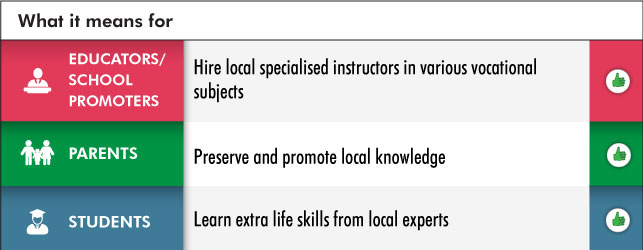NEP 2020: SCHOOL EDUCATION | Teachers
The NEP 2020 has reconfigured the curriculum and pedagogy of school education to 5 + 3 + 3 + 4 design with an aim to make them responsive and relevant to the developmental needs and interests of learners at different stages of their development. However, it will not be necessary to make any parallel changes to the physical infrastructure. The policy aims at producing engaged, productive, and contributing citizens for building an equitable, inclusive, and plural society as envisaged by our Constitution.
Recruitment and deployment
1. To ensure that truly excellent students enter the teaching profession – especially from rural areas – a large number of merit-based scholarships shall be instituted across the country for study at outstanding 4-year integrated B.Ed. programs. Such scholarships will provide local job opportunities to outstanding local students (especially female students), so that these students may serve as local-area role models and as highly-qualified teachers who speak the local language.

2. Transfers will occur in very special circumstances, e.g., for promotions of outstanding teachers and administrators to leadership positions, as suitably laid down in a structured manner by State/UT governments.

3. Teacher Eligibility Tests (TETs) will be extended to cover teachers across all stages (Foundational, Preparatory, Middle and Secondary) of school education. For subject teachers, suitable TET or NTA test scores in the corresponding subjects will also be taken into account for recruitment.

4. To ensure an adequate number of teachers across subjects – particularly in subjects, such as art, physical education, vocational education, and languages – teachers could be hired to a school/school complex and sharing of teachers across schools can be considered in accordance with the grouping of schools format adopted by State/UT governments.

5. To promote local knowledge and expertise, schools/school complexes will be encouraged and indeed will be supported with suitable resources to hire local eminent persons or experts as ‘specialized instructors’ in various subjects, such as in traditional local arts, vocational crafts, entrepreneurship, agriculture, or any other subject.

6. A comprehensive teacher-requirement planning exercise will be conducted across India and in each State to assess expected teacher and subject vacancies over the next two decades. All the above-described initiatives in recruitment and deployment will be scaled as needed over time, with the aim to fill all vacancies with outstanding teachers, including outstanding local teachers. The practice of hiring new `para-teachers’ (teachers on short-term contracts) will eventually be phased out.

Also read:
NEP 2020: SCHOOL EDUCATION | Holistic development of learners
NEP 2020: SCHOOL EDUCATION | Change in Academic structure
NEP 2020: SCHOOL EDUCATION | Curriculum and Pedagogy
NEP 2020: SCHOOL EDUCATION | Effective resourcing and effective governance
NEP 2020: SCHOOL EDUCATION | Service environment and culture

















Add comment